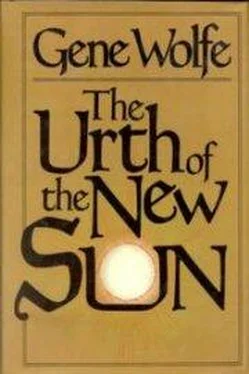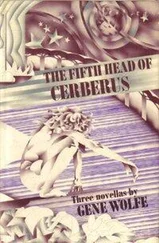Chapter XIII — The Battles
IT WAS only an image, yet so real an image that for an instant I was ready to believe it was a second self who stood there. As I watched, he wheeled, waved with preposterous grandeur toward a vacant corner of the room, and took two strides. With the third he vanished; but he had no sooner done so than he reappeared at the spot where he had first been. For a long breath he remained there, then he turned, waved once more, and strode forward.
The barrel-chested leader croaked an order in a tongue I did not understand, and someone loosed the wire that bound my hands.
Again my semblance stepped forward. Having relieved myself of something of the contempt I felt for him, I was able to note his dragging foot and the arrogant angle at which he poised his head. The leader spoke again, and a little man with dirty gray hair like Hethor’s told me, “He desires you to do likewise. If you do not, we will kill you.”
I scarcely heard him. I recalled the finery and gestures now, and without the least desire to return in memory to that time, I was captured by it as by the devouring wings in the air shaft. The pinnace (which I had not then known was merely the tender of this great ship) reared before me, its pont extended like a cobweb of silver. My Praetorians, shoulder to shoulder for more than a league, formed an avenue at once dazzling and nearly invisible.
“Get him!”
Ragged men and women swirled around me. For an instant I supposed I was to be killed because I would not walk and raise my arm; I tried to call to them to wait, but there was no time for that or anything.
Someone seized my collar and jerked me backward, choking. It was an error; when I reeled against him, I was too near for him to use his mace, and I drove my thumbs into his eyes.
Violet light stabbed at the frenzied crowd; half a dozen died. A dozen more with half-ruined faces and missing limbs screamed. The air was full of the sweet smoke of burning flesh. I wrested his mace from the man I had blinded and laid about me. It was foolish — yet the jibers, who bolted from the room as rats fly a ferret, fared worse than I; I saw them reaped like grain.
More wisely, the barrel-chested leader had thrown himself to the floor at the first shot, an ell or so from my feet. Now he sprang for me. The mace head was a gear wheel; it struck him where the shoulder joins the neck, with every ounce of strength I possessed behind it.
I might as effectively have clubbed an arsinoither. Still conscious and still strong, he struck me as that animal strikes a dire-wolf. The mace flew from my hands, and his weight crushed the breath from my body.
There was a blinding flash. I saw his seven-fingered hands upraised, but there was between them only the stump of a neck that smoldered as stumps do where a forest has burned. He charged again — not at me but at the wall, crashed into it, and charged once more, wildly, blindly.
A second shot nearly cleaved him in two.
I tried to rise and found my hands slippery with his blood. An arm, immensely strong, circled my waist and lifted me. A familiar voice asked, “Can you stand?”
It was Sidero, and quite suddenly he seemed an old friend. “I think so,” I said. “Thank you.”
“You fought them.”
“Not successfully.” I recalled my days of generalship. “Not well.”
“But you fought.”
“If you like,” I said. Sailors boiled around us now, some flourishing fusils, some bloody knives.
“Will you fight them again? Wait!” He moved his own fusil in a gesture meant to silence me. “I kept the knife and the pistol. Take them now.” He was still wearing my belt, with my weapons on it. Clamping the fusil under what remained of his right arm, he released the buckle and handed the whole to me.
“Thank you,” I repeated. I did not know what else to say; and I wondered whether he had indeed struck me unconscious, as I had supposed.
The metal vizard that was his face provided no clues to his feelings, his harsh voice hardly more. “Rest now. Eat, and we will talk later. We must fight again later.” He turned to face the milling hands. “Rest! Eat!”
I felt like doing both. I had no intention of fighting for Sidero, but the thought of a meal shared with comrades who would guard me while I slept was irresistible. It would be easy (so I supposed) to slip off afterward.
The hands had carried rations, and we soon turned up more, the stores of the jibers whom we had killed. In a short time, we were sitting down to a fragrant dinner of lentils boiled with pork and accompanied by fiery herbs, bread, and wine.
Perhaps there were beds or hammocks nearby, as well as the food and the stove, but I for one was too exhausted to look for them. Though my right arm still pained me, I knew it could not do so severely enough to keep me awake; my aching head had been soothed by the wine I had drunk. I was about to stretch myself where I sat — though I wished that Sidero had preserved my cloak too — when a strongly built sailor squatted beside me.
“Remember me, Severian?”
“I should,” I said, “since you know my name.” The fact was that I did not, though there was something familiar in his face.
“You used to call me Zak.”
I stared. The light was dim, but even after allowance had been made for that, I could hardly believe him the Zak I had known. At last I said, “Without mentioning a matter neither of us wishes to discuss, I cannot help but remark that you appear to have changed a great deal.”
“It’s the clothes — I took them from a dead man. I’ve shaved my face too. And Gunnie has scissors. She cut off some of my hair.”
“Gunnie’s here?”
Zak indicated the direction with a motion of his head. “You want to talk to her. She’d like to talk too, I think.”
“No,” I said. “Tell her I’ll talk with her in the morning.” I tried to think of something more to say, but all I could manage was, “Tell her what she did for me more than repaid any harm.”
Zak nodded and moved away.
Mention of Gunnie had reminded me of Idas’s chrisos. I opened the pocket of the sheath and glanced inside to establish that they were still there, then lay down and slept.
When I woke — I hesitate to call it morning because there was no true morning — most of the hands were already up and eating such food as remained after the feast of the night before. Sidero had been joined by two slender automatons, such creatures as I believe Jonas must once have been. The three stood some distance apart from the rest of us, talking in tones too low for me to overhear.
I could not be sure if these volitional mechanisms were nearer the captain and the upper officers than Sidero, and as I was debating whether to approach them and identify myself, they left us, disappearing at once in the maze of passages. As if he had read my thoughts, Sidero walked over to me.
“We can talk now,” he said.
I nodded and explained that I had been about to tell him and the others who I was.
“It would do no good. I called when first we met. You are not what you say. The Autarch is secure.”
I began to expostulate with him, but he held up his hand to silence me. “Let us not quarrel now. I know what I was told. Let me explain before we argue again. I hurt you. It is my right and duty to correct and chastise. Then I had joy of it.”
I asked him if he referred to his striking me when I lay unconscious, and he nodded. “I must not.” He seemed about to speak further, but did not. After a moment he said, “I cannot explain.”
“We know what moral considerations are,” I told him.
“Not as we. You believe you do. We know, and yet often make mistakes. We may sacrifice men to save our own existence. We may transmit and originate instructions to men. We may correct and chastise. But we may not become as you are. That is what I did. I must repay.”
Читать дальше










